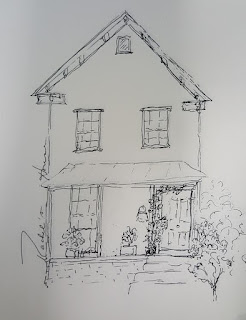[Note: I'd written this a few weeks ago and forgotten to publish it, so consider it a letter lost for a while in the mail...]
 |
| I sit here writing |
People around here consider the porch a Southern thing, but I think that's a bit provincial. Growing up, the porch on our first house made a play area in rainy weather out from under our mother's feet. The front porch at the shore slept men coming in late from work at night (the women and children all crowded into the beds upstairs) and provided a good place to hide with a good book during the day on the swing. It's still the place to chat, read, write letters, nap, enjoy tea, coffee, wine or a gin and tonic with people who drop in.
When we taught in New Hampshire or visited my parents there on weekends, the porch in either house was the first place I'd take my cup in the mornings, whatever the season. One memorable dawn, I looked out to a mother bear raiding the garden, while her cubs sat in the patio chairs below me, picking at the pillow ticking, obviously having been told to "be good and sit here now, while I get us breakfast".
At our old home in Washington, the open front porch quickly introduced us to the neighborhood, and the back screened porch became so much an extension of the kitchen that most of the year the door between them stayed wide open as we wandered in and out, to bring the day or the groceries in, do the crossword, plan the next garden shape or escape from a crowded kitchen. On warm days in December, even, it was a place to retreat from winter.
 |
| front porch on main street |
In quieter moments, I could paint there, the light perfect. I did one of my best works at that table, a complication of watercolor, wire, screen and beads worked into a folding, falling-open sort of book I called Back Porch Journal. (Amazingly, the fine art show judge that year actually got what it was...)
 |
| back porch journal, 2011 |
These days, sometimes at the near-end of a walk, I'll park myself on a bench in the arboretum, a kind of porch itself, to contemplate the quiet.
 |
| view from a bench in the arboretum |
 |
| view from a porch bench on campus |
You can see all sorts of things from a porch, like looking out a window without frame. Not only who or what passes by, but interior passages, too. You can hear yourself think, and that's not a bad thing, especially these days, when (often deliberately) distracting noises from everywhere seem to cloud our brains. You can hear others...really listen to children, friends, neighbors, passersby, whether you are the intended audience or not. You're not eavesdropping, but you are connecting with the world as it comes and goes.
The word from the porch or the street, the casual remark of a stranger in passing...they're all clues to the reality beneath the reality shows that seem to pass for what is. Leaving aside the generalities of opinion polls and flash-talk, and listening instead to the personal and highly individual thoughts of people who speak and act as themselves, means that we can adopt the human values we practice one person at a time. On the porch, they tend to come out in more reflective, considerate, and respondable ways.
We may not like everything we hear or see, but that vantage point, from where we sit, gives us leave to try to understand it and put it in perspective, whether we agree with it or not. And then we can think about where we really stand. And why. The three-second (or 10-word) spits we've been encouraged to adopt as communication too often tend to degenerate rational thought into fallacy. Porches slow us down, make us take a wider view of the neighborhood and the world where we belong.
Porches bring us back to calm reason and sense, and to belief. They return us to ourselves.
The word from the porch or the street, the casual remark of a stranger in passing...they're all clues to the reality beneath the reality shows that seem to pass for what is. Leaving aside the generalities of opinion polls and flash-talk, and listening instead to the personal and highly individual thoughts of people who speak and act as themselves, means that we can adopt the human values we practice one person at a time. On the porch, they tend to come out in more reflective, considerate, and respondable ways.
We may not like everything we hear or see, but that vantage point, from where we sit, gives us leave to try to understand it and put it in perspective, whether we agree with it or not. And then we can think about where we really stand. And why. The three-second (or 10-word) spits we've been encouraged to adopt as communication too often tend to degenerate rational thought into fallacy. Porches slow us down, make us take a wider view of the neighborhood and the world where we belong.
Porches bring us back to calm reason and sense, and to belief. They return us to ourselves.


